The book and the film
Luhrmann translates the book into the contemporary language.
It is no longer Fitzgerald’s work though characters are wearing outfits of the 1920s.
While analyzing the film, it is necessary to focus on the film with little or no reference to the book.
It’s tempting to compare the book and the film, but the film is an individual work of art. More so, the ideas considered in the film are still up-to-date and should be carefully contemplated on.
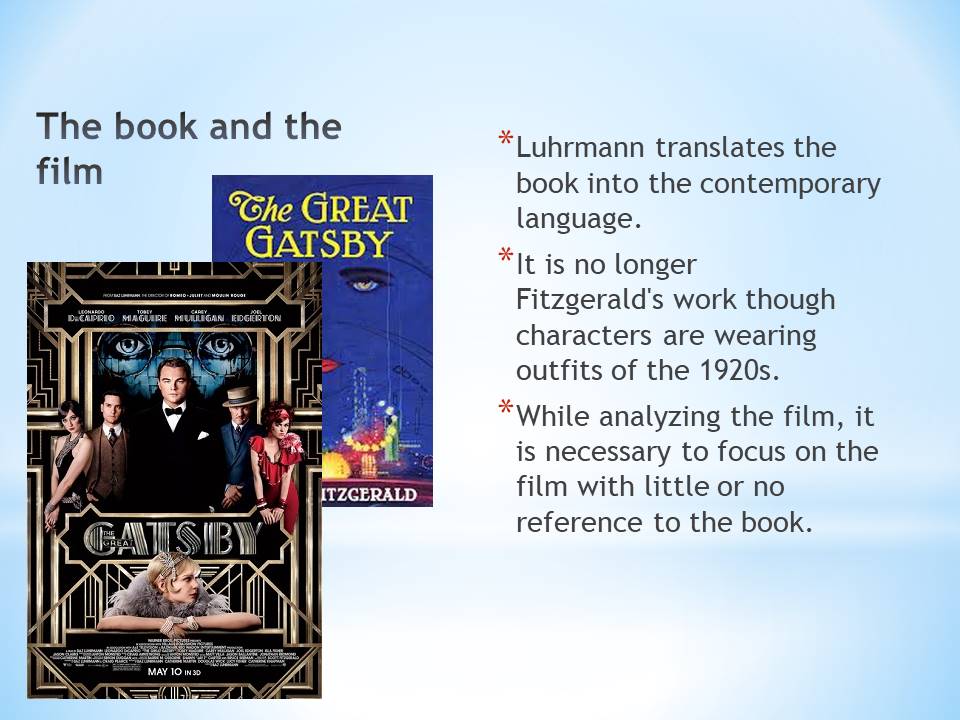
A lavish and mysterious millionaire
- No one knows who he is.
- No one knows what he does.
- No one knows how rich he is.
- Everyone enjoys his hospitality.
- Gatsby’s wealth is one of the major themes of the film.
The filmmakers never stop depicting Gatsby’s wealth and his otherness. He throws money around and he is a topic of heated debates in the society.
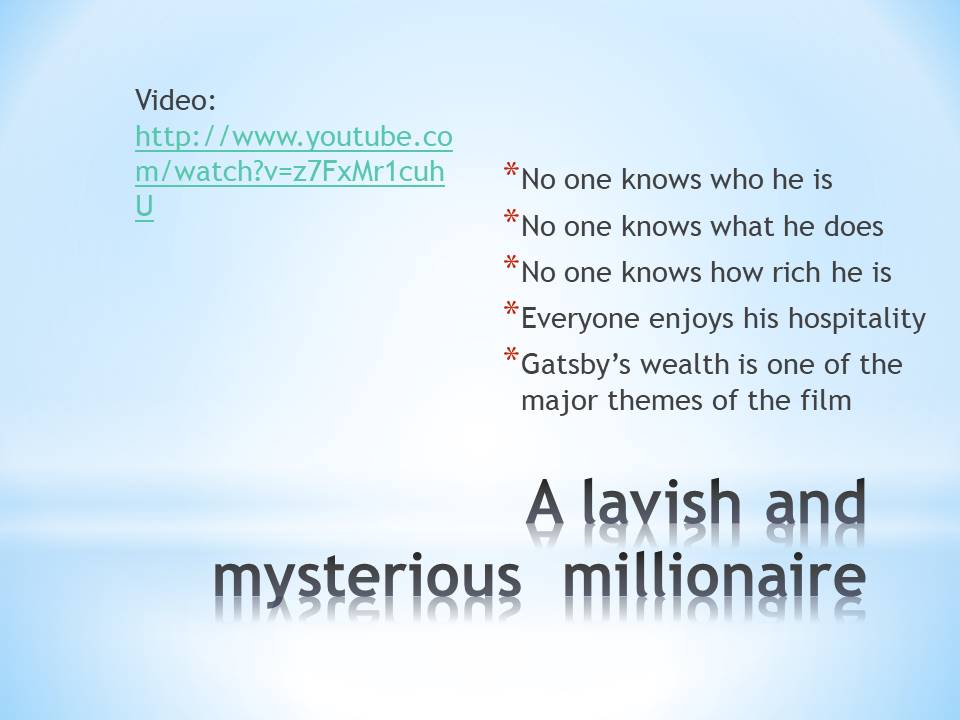
The way he lives
- He makes parties to impress.
- His parties are tools to reach his major goal.
- Luhrmann keeps stressing the idea of his otherness.
He shows off his wealth. He does it to attract Daisy’s attention and make her see his success, and make her love him. Luhrmann also stresses the idea of otherness through his crazy ways (driving fast cars, making parties, decorating main character’s house to meet his beloved). He is rich, but he does not look down on other people as American aristocrats often do.
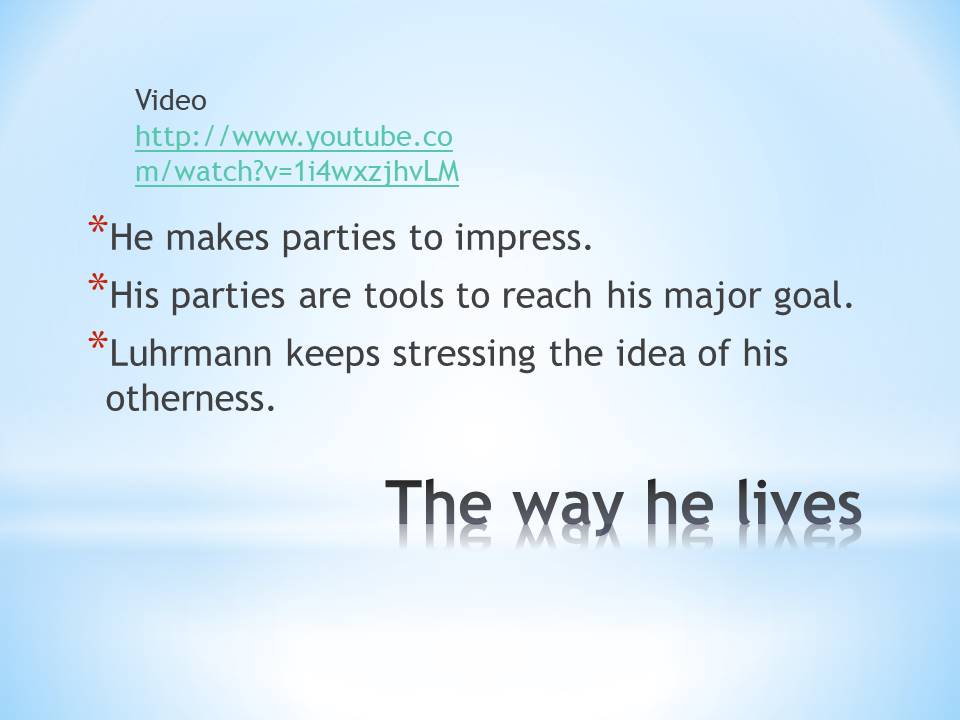
The use of camera
- The mix of long shots, middle shots, and close-ups.
- The use of high angles and eye level shots.
- Bright colors stress the idea of wealth.
The use of camera helps reveal the lavish ways and desire to put on the ritz. Camera moves quickly revealing the chaos of the party. The close-up shows that Gatsby knows what he is doing (he’s got his reasons to live this life). There’s also some irony and mockery in Gatsby’s smile, the close-up stresses this idea.
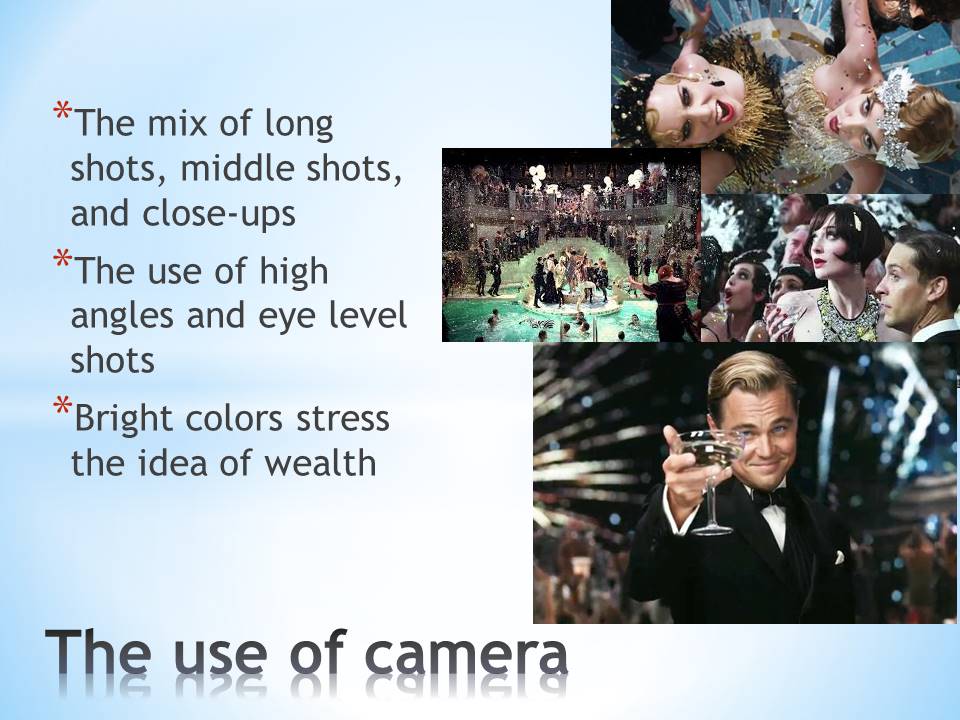
Significant details
Pramaggiore and Wallis (2011) stress that details are crucial for conveying the central ideas. Luhrmann manages to reveal Gatsby’s otherness with the help of several significant details revealing a number of ideas:
- Hypocrisy: White color for higher society and bright colors for their wild parties.
- Otherness: Gatsby makes wild parties for everybody without hiding.
- Inaccessibility: The scene where Gatsby is reaching Daisy’s house is one of the key scenes as it shows the chasm between him (a new millionaire) and them (American aristocracy).
White color always accompanies the higher society when they are playing their roles of rich and noble people, though bright colors (red, which is the color of lust) are used for their parties. The higher society is hypocritical. Notably, the use of high angles and fast movements of camera reveal chaos of their parties. Gatsby does not hide his ways, the only thing he is trying to hide is the source of his income.
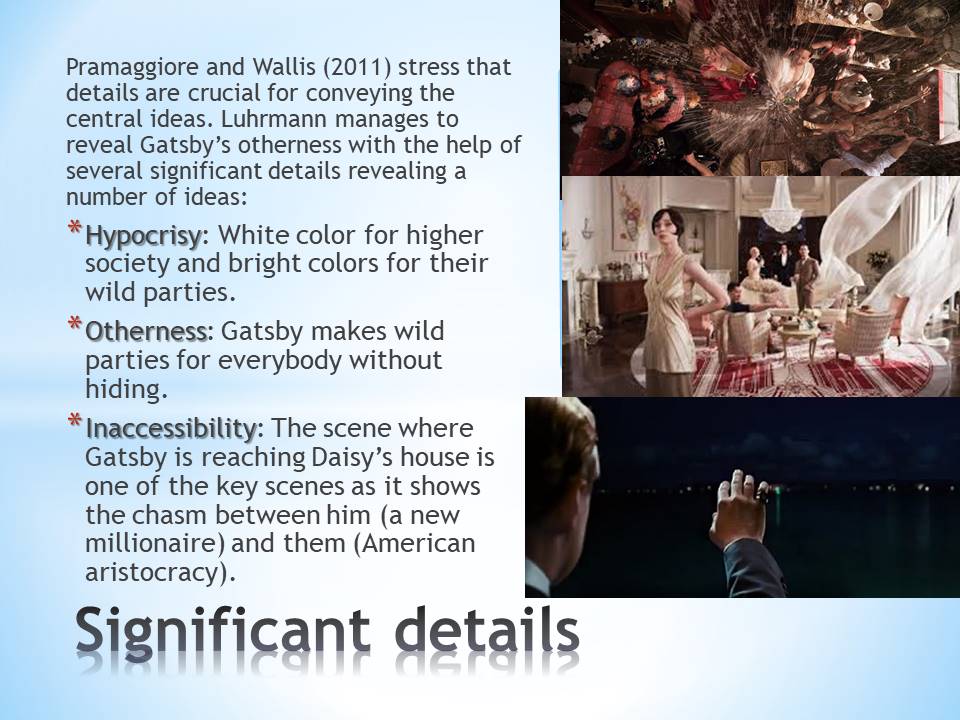
Gatsby’s Dream
The girl and the money
Gatsby longs for his American Dream:
- To become very rich to be able to make American aristocracy respect him;
- To enter the world of the American aristocracy;
- To be noticed by his Daisy and become loved by his innocent Daisy;
- To be able to provide for his new family and to give Daisy everything she might want.
American dream is people’s anticipation of great wealth if they work hard enough. Gatsby transforms it as he does not work in the sense everybody else understand that.
Noteworthy, he is ready to give the whole world to her.
Tools used
Luhrmann (2013) reveals true colours of Gatsby and Daisy when Gatsby shows his world to his beloved:
- Bright colors emphasize the grandness of the great mansion.
- Gatsby is a bit childish and innocent in his own way as he is ready to give the entire world to Daisy but has his own understanding of this, throwing things on Daisy.
- Daisy’s shallowness is revealed through her exhalation at the sight of Gatsby’s wealth. Daisy does not care about his inner world as she needs the Great Gatsby and his money.
Luhrmann reveals Gatsby’s understanding of giving and his nature as well as Daisy’s nature in this very suggestive scene. Gatsby understands that the world of the American aristocracy is built on money and he thinks love can also be built on that. He tries to win Daisy’s heart by throwing valuables around (literally). Daisy is shallow enough to be bought by that, but Gatsby is too happy to notice that his innocent and beautiful Daisy has nothing to do with Daisy Buchanan.
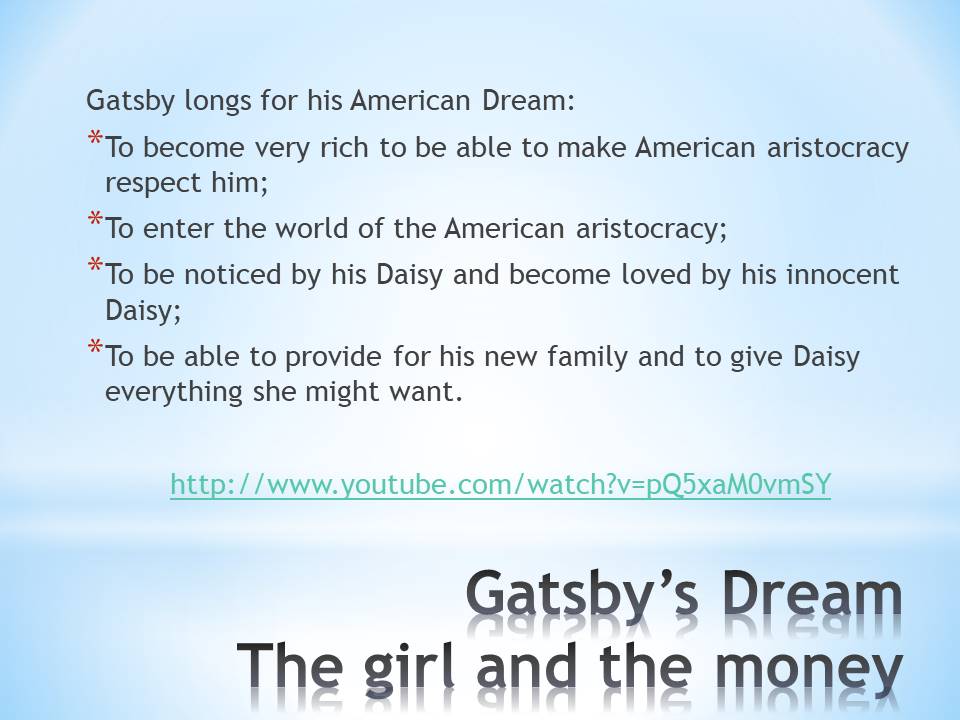
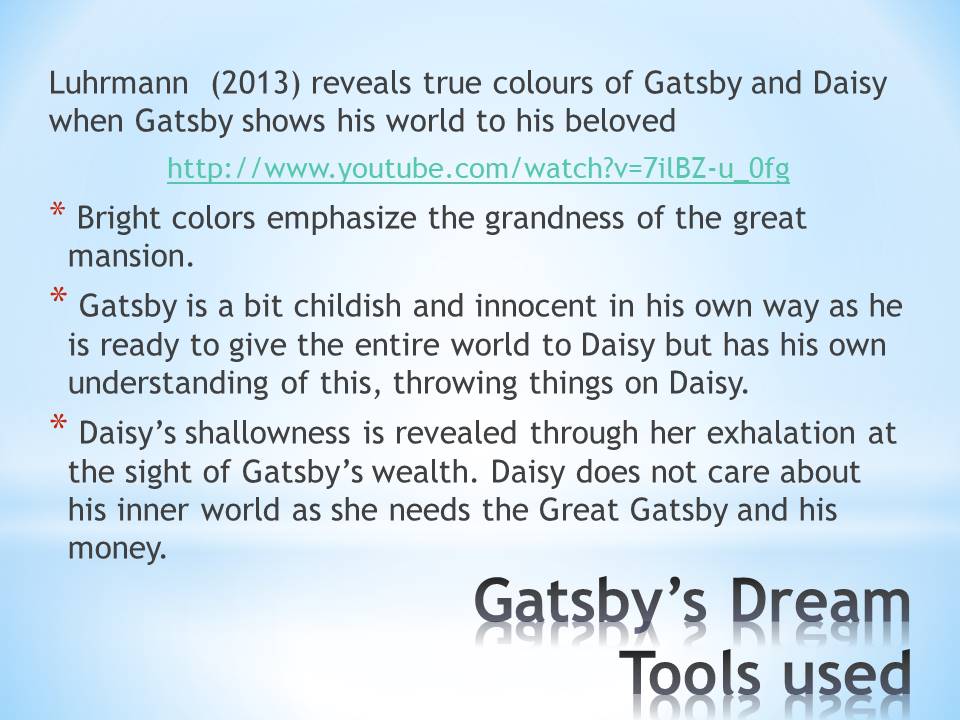
The use of music
Luhrmann (2013) employs his checked strategy to use contemporary music in the film and reaches several goals:
- Make the contemporary viewer feel the atmosphere;
- Translate the old tale into the language understandable for the contemporary viewer;
- Make the viewer feel that the society of the 1920s is not that different from the society of the 2010s.
It’s better to turn the music on (for the back sound). Luhrmann used it in Moulin Rouge (2001) quite successfully. It is noteworthy that he uses music which is a mix of 1920s music and contemporary tunes (hip hop, pop). This makes the music sound understandable for the contemporary viewer and creates a false impression that the music was very similar than, i.e. the issues in the society were also similar to ours. Of course, the music perfectly reveals the atmosphere.
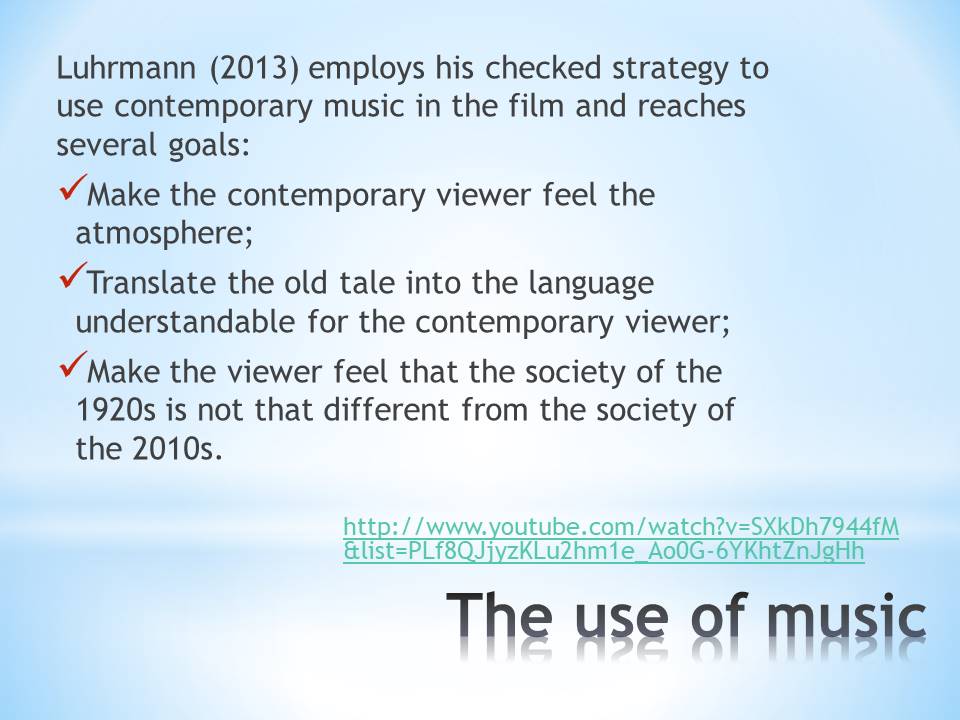
The cast
Luhrmann makes the best of his cast:
- Leonardo DiCaprio, Joel Edgerton, Isla Fisher and Elizabeth Debicki create lively and charismatic characters;
- Tobey Maguire and Carey Mulligan are rather unimpressive though their flaws can remain unnoticed due to the advantages of the film;
- The tale told seems a true story of real people.
It is essential to focus on the cast as Luhrmann manages to tell the story through the characters created. The overall impression is positive as the cast managed to recreate the atmosphere of the 1920s and tell a story of decay and hypocrisy.
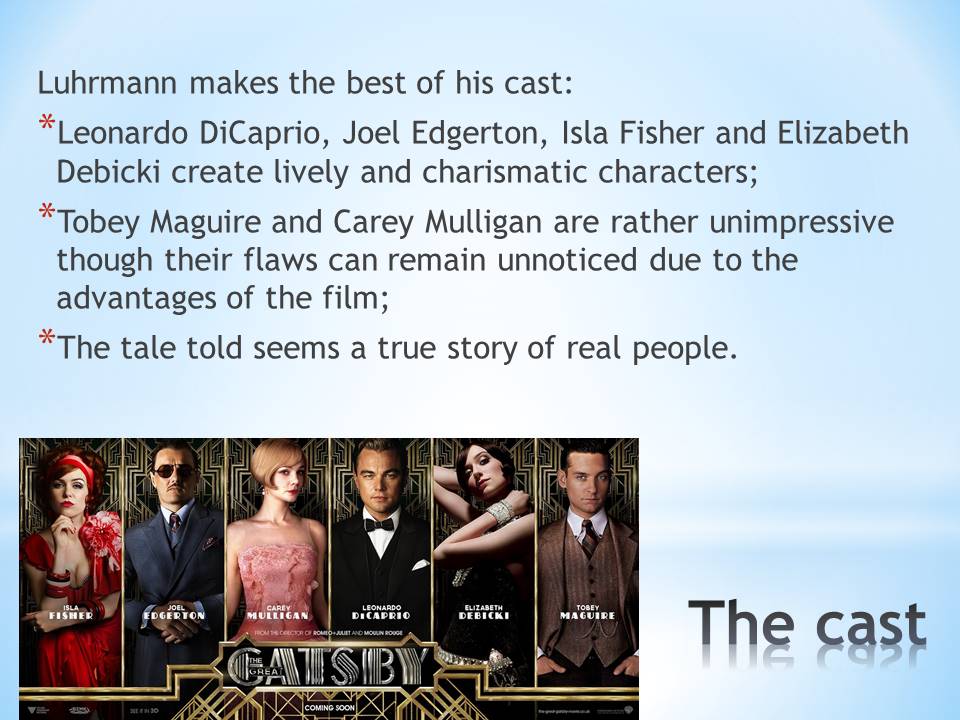
Conclusion
Luhrmann tells the story of decay of the American higher society in the 1920s.
He draws parallels between the world of the 1920s and the world of the 2010s.
He also reveals strange forms the American Dream can take.
Finally, he uses effective tools to make the viewers think of such concepts as love, life, society, hypocrisy, loneliness and decay of morals.
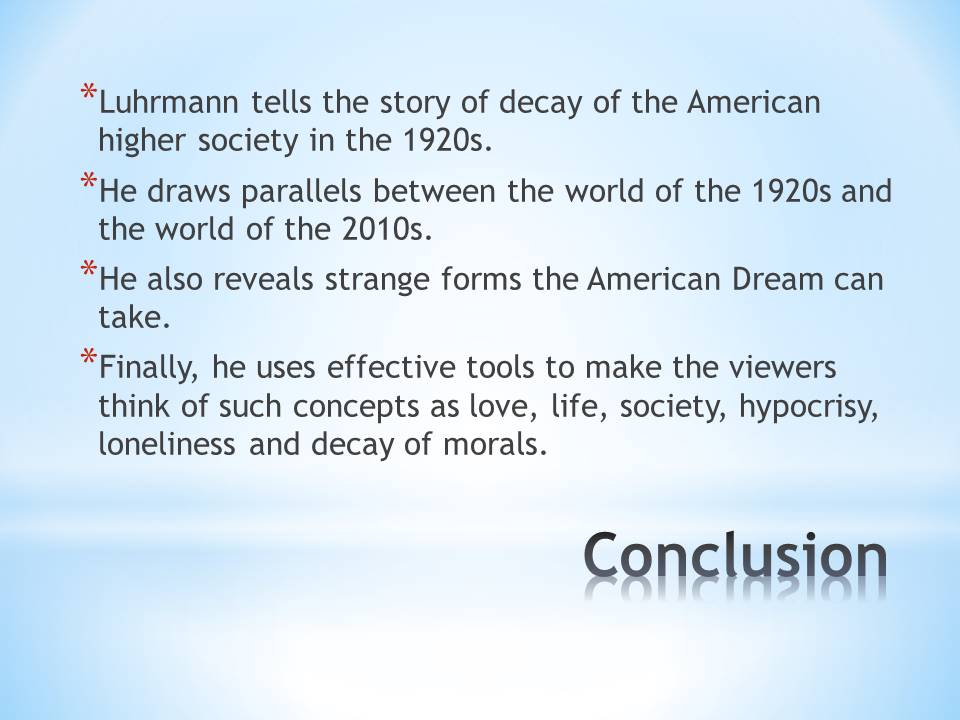
Reference List
Luhrmann, B. (Director). (2013). The great Gatsby [DVD]. Burbank, CA: Warner Brothers.
Pramaggiore, M., & Wallis, T. (2011). Film: A critical introduction. London, UK: Laurence King Publishing Ltd.